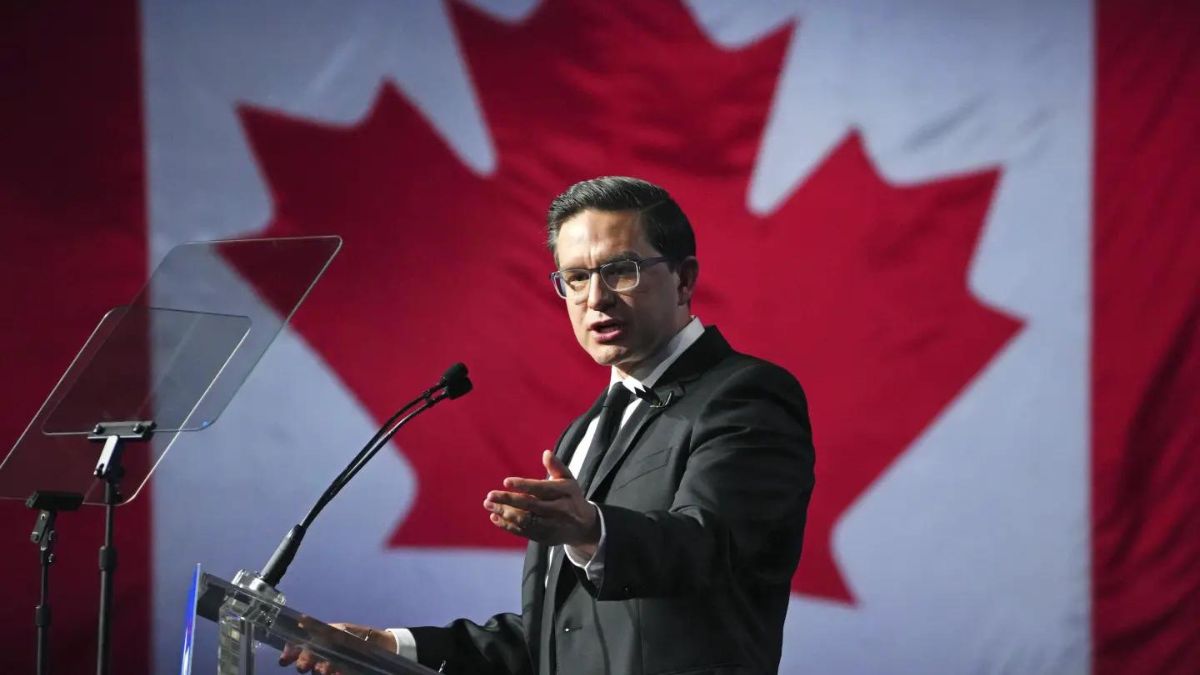In a departure from convention, the leader of Canada’s primary opposition party was expelled from the House of Commons on Tuesday after he called Canadian Prime Minister Justin Trudeau “a wacko,” marking the latest clash between the two figures poised to contest an election next year.
The right-of-center Conservatives, serving as the official opposition, maintain a substantial lead in the polls, with leader Pierre Poilievre frequently criticising the Liberal administration for implementing a carbon tax he contends is driving up inflation.
“When will we put an end to this wacko policy by this wacko prime minister?” he queried Trudeau during the session in the elected lower chamber of the House of Commons.
Poilievre refuses to retract his comments
Speaker Greg Fergus, affiliated with the Liberal Party, deemed Poilievre’s remark both inappropriate and unacceptable, urging him four times to retract it. However, Poilievre persistently refused, suggesting instead that he would substitute the term “extremist” or “radical.”
In response, Fergus accused Poilievre of disregarding the authority of the speaker and consequently directed him to depart from the House for the remainder of the day’s session. Poilievre and the majority of his fellow legislators subsequently exited the chamber.
Trudeau addressed reporters earlier that day, condemning Poilievre for associating with far-right groups. “That is not responsible leadership. That is dangerous for democracy, it’s dangerous for Canadians,” he asserted.
Impact Shorts
More ShortsEjections from the House are relatively rare occurrences, and the speaker’s office could not immediately provide information on the last instance of an official opposition leader being expelled, reported Reuters.
Who is Pierre Poilievre? - early years
Pierre Poilievre was born on June 3, 1979, in Calgary, Alberta, to parents of Ukrainian and French-Canadian descent. Growing up in Alberta, he developed a profound appreciation for Canada’s rich cultural landscape and conservative principles.
His academic journey led him to the University of Calgary, where he earned a Bachelor of Arts in Political Science. This educational background provided him with a solid footing for his future endeavors in politics, allowing him to delve into the nuances of governance and public policy.
Poilievre’s venture into the political arena commenced during his youth when he became involved in the conservative youth movement. His fervor for conservative values coupled with his eloquent communication skills quickly garnered attention within the party ranks.
In 2004, at just 25 years old, he contested as the Conservative candidate for the Nepean-Carleton riding in Ontario’s federal election. His victory in that election was a surprise to many, as he emerged triumphant, becoming the youngest member of the Canadian Parliament at the time. This win marked the inception of his political journey and paved the way for his subsequent rise within the Conservative Party.
What distinguishes Poilievre?
It’s his talent for constructing a winning coalition that spans populists and social conservatives to center-right moderates.
During a 2023 Conservative Party policy convention in Quebec City, attended by over 2,500 party members, Poilievre seized the spotlight. His adeptness at unifying a party fractured since losing power to Trudeau’s Liberals in 2015 was prominently showcased.
At the heart of Poilievre’s agenda lies tackling Canada's housing crisis . According to a report from Politico, his capacity to resonate with ordinary citizens surpasses that of Trudeau. Poilievre’s foremost objective, should he assume power, is to abolish the government’s carbon tax.
His rallying cry, “axe the tax,” embodies a slogan worthy of a bumper sticker. The conclusion of most of his rallies is punctuated by a fervent chant: “Your home. My home. Our home. Bring it home.”
Is Poilievre Canada’s Trump?
Trudeau’s relationship with Poilievre is marked by tension, with Trudeau accusing him of espousing extremist views and aligning with the Make America Great Again movement associated with former US President Donald Trump.
The Conservative leader adds a fiery fervor to his rallies, often launching verbal attacks against Trudeau’s administration. In a consistent theme across most gatherings, Poilievre pledges to defund the Canadian Broadcasting Corporation (CBC), a pledge that strikes a chord with critics of the public broadcaster and skeptics of mainstream media.
He has urged the firing of the head of Canada’s central bank, calling him Trudeau’s personal ATM machine.
The 43-year-old is a career politician and was a Cabinet minister in then-Prime Minister Stephen Harper’s government. He embraced Canadians who were against vaccine mandates and supported the freedom truck convoy that paralysed Canada’s capital and blockaded the border with the US.
How do things stand before the elections?
Trudeau channeled the star power of his father, the Liberal Party icon and late Prime Minister Pierre Trudeau, when he first won election as premier in 2015 and has led his party to the top finish in two elections since. But his popularity has faded, reported AP.
However, the Liberals and the opposition New Democratic Party reached an agreement that would see Trudeau’s party keep power until 2025. Trudeau has said he will lead his party into the next election.
The upcoming election must be conducted by late October 2025, and public opinion surveys indicate that the Conservatives are positioned to secure a significant majority over the center-left Liberals, who have held power since November 2015.
With inputs from agencies


)

)
)
)
)
)
)
)
)



